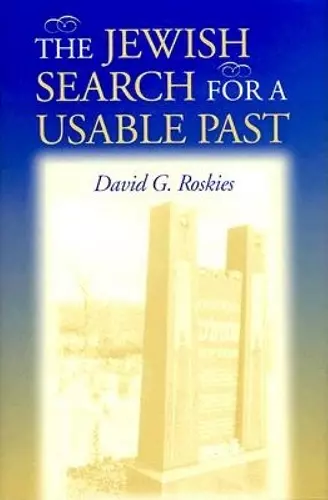The Jewish Search for a Usable Past
Format:Hardback
Publisher:Indiana University Press
Published:22nd May '99
Currently unavailable, and unfortunately no date known when it will be back

A lively tour of the landscape of modern Jewish memory sites from the Old and New Worlds and the Land of Israel.
"Roskies has illuminated a path to further self-understanding of who Jews are and the type of bridges used to reach a usable past." —Lifestyles Magazine
"[The author has] an exceptional gift for historical reconnection . . . The force of the shtetl, if not its romance, remains very much within him." —Irving Louis Horowitz, Congress Monthly
" . . . fine new volume of essays . . . " —David Singer, Commentary
"These studies, each a gem unto itself, together reveal how Jews cope with loss and catastrophe and illustrate that it is exactly by coping with loss and tragedy that Jews create a usable past and in, in the process, define their present and shape their future." —Choice
After redrawing the map of modern Jewish memory, David G. Roskies takes the reader on a grand tour of major memory sites, each of which is built upon foundations of rebellion, rupture, and loss. Among them: chronicles of catastrophe from the Warsaw ghetto; a gallery of rabbis and zaddikim who are really rebels in disguise; a failed revolution recast into an Honor Row of magnificent tombstones; and a Holy Land where the search for a sacred space is led by those least likely ever to find it. The creativity with which Jews have coped with loss and catastrophe in modern times is richly revealed in this lively account.
Roskies (Jewish Theol. Seminary) shows that the Jewish present is not evolving as a simple continuation of the past nor, contrary to what is often claimed, is it emerging from a radical break with the past. It sits, rather, upon what Roskies calls memory sites, images of the past recreated from the ashes of destruction and the potentially debilitating sense of Jewish loss these catastrophes create. How are such memory sites created? Roskies illustrates the process through careful and engaging examinations of, among other topics, Jewish chronicles of the Warsaw Ghetto, of Jewish rethinking of Jewish participation in the early socialist and Zionist movements, and of the function of the concept of holy space for secular Israelis. These studies, each a gem unto itself, together reveal how Jews cope with loss and catastrophe and illustrate that it is exactly by coping with loss and tragedy that Jews create a usable past and, in the process, define their present and shape their future. Recommended for general readers and for faculty and researchers. —A. J. Aver
-- Peck * ChoiISBN: 9780253335050
Dimensions: unknown
Weight: 454g
232 pages